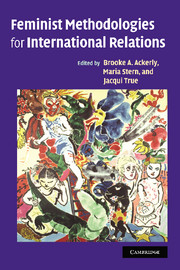Book contents
- Frontmatter
- Contents
- Notes on the contributors
- Acknowledgments
- 1 Feminist methodologies for International Relations
- Part I Methodological conversations between feminist and non-feminist IR
- 2 Feminism meets International Relations: some methodological issues
- 3 Distracted reflections on the production, narration, and refusal of feminist knowledge in International Relations
- 4 Inclusion and understanding: a collective methodology for feminist International Relations
- Part II Methods for feminist International Relations
- Part III Methodologies for feminist International Relations
- Conclusion
- Bibliography
- Index
2 - Feminism meets International Relations: some methodological issues
Published online by Cambridge University Press: 12 January 2010
- Frontmatter
- Contents
- Notes on the contributors
- Acknowledgments
- 1 Feminist methodologies for International Relations
- Part I Methodological conversations between feminist and non-feminist IR
- 2 Feminism meets International Relations: some methodological issues
- 3 Distracted reflections on the production, narration, and refusal of feminist knowledge in International Relations
- 4 Inclusion and understanding: a collective methodology for feminist International Relations
- Part II Methods for feminist International Relations
- Part III Methodologies for feminist International Relations
- Conclusion
- Bibliography
- Index
Summary
Feminist approaches entered the discipline of International Relations (IR) at the end of the 1980s, about the same time as the “third debate,” or the beginning of what has been called a “postpositivist era” (Lapid 1989). Postpositivism, which includes a variety of approaches such as critical theory, historical sociology and postmodernism, challenged the social scientific methodologies that had dominated the discipline, particularly in the United States. Most IR feminists situate themselves on the postpositivist side of the third debate. Seeing theory as constitutive of reality and conscious of how ideas help shape the world, many IR feminists, together with scholars in other critical approaches, have challenged the social scientific foundations of the field. Most IR feminist empirical research, which took off in the mid-1990s, has not followed the social scientific path – formulating hypotheses and providing evidence that can be used to test, falsify, or validate them. With some exceptions, IR feminists have employed a variety of methods, most of which would fall within postpositivist methodological frameworks.
In this chapter, I undertake three tasks related to IR feminists' methodological preferences with particular emphasis on the state and its security seeking practices. I choose to focus on the state because it is the central unit of analysis in IR, and on security because it is an issue at the core of the discipline. I suggest how these methodological preferences differ from conventional social scientific frameworks.
- Type
- Chapter
- Information
- Feminist Methodologies for International Relations , pp. 19 - 41Publisher: Cambridge University PressPrint publication year: 2006
- 51
- Cited by



